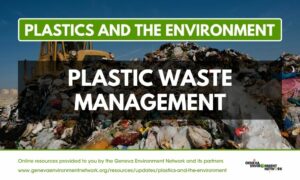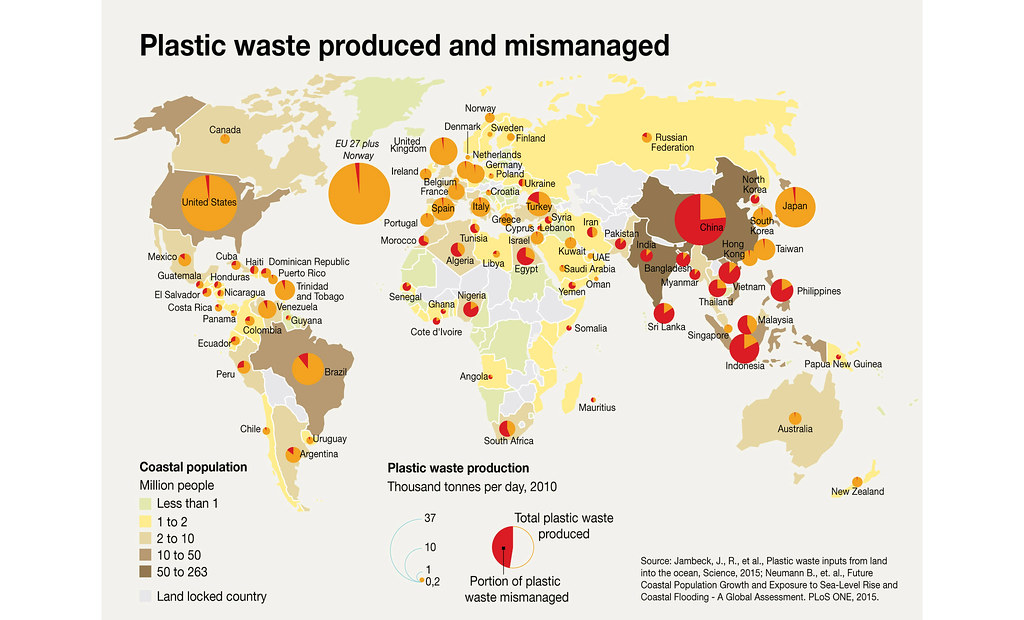Nouvelle
Plastic Waste Management | Plastics and the Environment Series
In 2020, the world produced 367 million metric tons of plastic waste, a number that is set to exponentially increase in the coming years. While reducing the generation of plastic waste in the first place is essential, efforts to manage and dispose of the existing waste is crucial to address the plastic crisis. This page is part of our Plastics and the Environment series, a set of online resources on the plastics crisis, its impact on people and the environment, and international cooperation to address this global problem. They include resources and news from organizations in Geneva and beyond, including UN-system organizations and other IOs, governmental authorities, civil society organizations, academic institutions and journals, and renowned newspapers.
A Glimpse on Global Plastic Waste
According to the OECD Global Plastic Outlook, the world generated 353 million tonnes of plastic waste in 2019, a number which has more than doubled since 2000. Out of this, only 9% was rycled while almost 50% was landfilled, 19% incinerated, and 22% was discarded in uncontrolled sites or in the environment. Many parts of the world are not equipped to deal with the large amount of plastic waste they generate or import from aboard. According to the UNEP Global Waste Management Outlook, 3 billion people do not have access to controlled disposal services for solid waste, and 2 billion people still lack access to regular waste collection. Therefore, a large portion of plastic waste is either littered or inadequately disposed. Of all plastics produced since the 1950, nearly 80% ended up in the environment or in landfills. With no changes in the way we produce, consume and dispose of plastic, another 33 billion tonnes of plastic is expected to accumulate on the planet by 2050.
In terms of global governance, the Basel Convention is the key international instrument to regulate transboundary movements of hazardous wastes and their disposal; the Secretariat is based in Geneva. In 2019, Parties to the Convention agreed to add plastic waste under the convention, making it the first international agreement to directly address the issue of plastic pollution. At the 16th Conference of the Parties held in May 2023, Parties to the Basel Convention adopted technical guidelines on the environmentally sound management of plastic waste, POPs waste, and e-waste.
- Beat Plastic Pollution | UNEP
- Plastic pollution| Our World in Data
- Guide to Waste – Plastics | Swiss Federal Office for the Environment
- There’s an Explosion of Plastic Waste. Big Companies Say ‘We’ve Got This.’ | The New York Times | 5 April 2024
- Wasteland – Europe’s plastic disaster | Investigate Europe | 27 April 2023
- The Plastic Waste Makers Index 2023 | Minderoo Foundation | February 2023
- Global plastic waste set to almost triple by 2060, says OECD | OECD | 3 June 2022
- Plastic Myths | GRID-Arendal | 15 March 2022
- Plastic pollution is growing relentlessly as waste management and recycling fall short, says OECD | 22 February 2022
- Geneva Beat Plastic Pollution Dialogues | Plastics and Waste | Geneva Environment Network | 26 November 2020
Environmentally Sound Management of Plastic Waste
While avoiding the generation of plastic waste is overall preferable, environmentally sound management of plastic waste, once it is generated, is essential to protect human health and the environment. Without proper collection and disposal system, plastic contaminate the air, soil and water, thus causing harm to ecosystems and people. Since the adoption of the plastic waste amendments, the Basel Convention provides guidance for better management of plastic waste.
- Environmentally sound management of plastic waste | Basel Convention & GRID-Arendal
- Plastic Waste Partnership | Basel Convention
- National Action Plan on Plastic Waste Management 2021-2030 | UNEP IETC
- Smoke and Mirrors. The Realities of Plastic Credits and Offsetting | Break Free From Plastic and Global Alliance Against Incinerator Alternatives | 16 November 2023
- The economic impact of plastic pollution, and the benefits of reducing mismanaged waste | IUCN | 2 November 2023
- Nonviable carbon neutrality with plastic waste-to-energy | Serang Kwon, Jieun Kang et al. | Energy & Environmental Science | 19 June 2023
- UN Chemicals & Waste Negotiations Make Key Advances, Delay Already Overdue Protections, and Offer Lessons for Future Plastics Treaty | CIEL | 12 May 2023
- SGP on plastic waste: All you need to know about the selected projects | Basel Convention | 12 November 2020
- Converting Plastic Waste into Fuel | WIPO | 20 April 2020
Plastic Waste Trade
As the amount of plastic waste generated has exponentially increased, so has the global trade of plastic waste. In 2018, about 8 million metric tonnes of plastic waste were traded internationally, amounting for around 3.3 billion USD. With lower energy and labour costs, countries in the Global South are often on the receiving end of such trade. However, an estimates 5 to 20% of imported scraps in these countries have no market value and ends up in landfills or incinerated, leading to air, soil and water pollution. Even when recycled, it is often done so in low-cost facilities with poor conditions, posing risks to workers’ and local communities’ health and to the environment. Since January 2021, the Basel Convention regulates global plastic waste trade with the entry into force of the Plastic Amendments.
Recycling
Since the 1950s, an estimated 9% of all plastic produced by humanity has been recycled. While there has been an increased interest in and development of plastic recycling systems and facilities, still only 14% of plastic waste is currently being collected for recycling. As plastic disposal in landfill and burning has damaging consequences on human and environmental health, recycling is increasing seen as having huge potential to tackle the plastic crisis. However, plastic recycling presents many challenges due to the nature of the material itself. Meanwhile, relying on recycling alone is not sufficient to solve the plastic crisis and address the full impacts of plastics across the value chain.
‘Offsetting’ is another practice associated with plastic recycling and that represents a false hope in tackling plastic pollution. The practice of collecting plastics already present in the environment, ‘legacy plastics’, cannot pay off for the production of virgin plastics because these usually accumulate levels of toxicity that renders them unrecyclable and do not compensate the damage caused by newly produced materials.
More on the Plastics Crisis
Our special series “Plastics and the Environment” provides resources on the status of the global plastic pollution, its impact on people and the environment, and international cooperation to address the plastics crisis.



